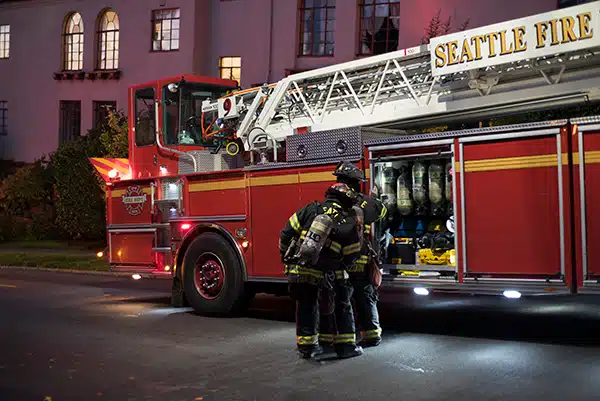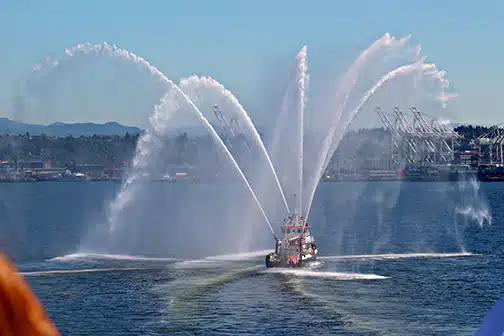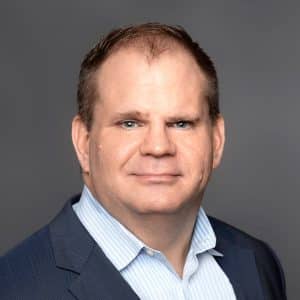Washington state firefighters are members of our community who put their lives, health, and safety on the line every day they go to work. If you’re a firefighter in Washington state, it’s important to know your firefighter benefits and rights to workers’ compensation under state law.
Firefighters not only respond to fires, but they are also called in for land and water rescues, vehicle accidents, emergency medical services, aircraft rescue, and a variety of other industrial and environmental incidents, often involving hazardous materials responses. Such circumstances can result in injury from smoke inhalation, burns, chemical exposure, and other painful and dangerous accidents. With continued exposure to a variety of high-risk environments, firefighters can easily sustain a serious workplace injury or develop an industrial disease.
Who Qualifies for Firefighter Benefits?
Firefighters are employed full-time, are fully compensated, and can be public or private (if the department includes over 50 firefighters). Firefighters also include fire investigators, emergency medical technicians (EMTs), and supervisors.

Firefighter Presumptions
Firefighters benefit from industrial disease presumptions in Washington state. A presumption is a legal inference that must be made considering certain facts. For example, if you are a firefighter diagnosed with a specified respiratory illness, it will be presumed you acquired this illness on the job. Presumptions are either rebuttable — meaning that they are rejected if proven to be false (or thrown into sufficient doubt by the evidence) — or are conclusive, meaning that they must be accepted to be true.
Firefighter Benefits in Washington State
Washington is recognized as one of the states with the most proactive laws to protect firefighter workers’ compensation benefits that injured and ill firefighters and their families deserve. Washington state firefighters receive special protections under the Washington State Department of Labor and Industries (L&I) that don’t extend to other industries and can make the success of an L&I — workers’ compensation claim far more likely. For example, firefighters who have a denied claim can take that claim directly to the Board of Industrial Insurance Appeals (BIIA). This means our team of experienced Seattle Workers’ Compensation and L&I Attorneys at Emery | Reddy, PLLC can start fighting for your firefighter workers’ compensation benefits right away. Washington is also one of the only states that will reimburse attorney fees if a firefighter wins their appeal.
Firefighters who have been exposed to an undue hazard at the emergency response site can also file a third-party claim, alleging negligence that increased the risk during the response. Common third-party claims for firefighters can include:
- Improper asbestos mediation,
- Harmful or illegal substances that increase the toxicity of smoke, and
- Faulty design or planning.
Third-party claims are instrumental in moving past the workers’ compensation and L&I schedules and getting to an insurance policy or tortfeasor — this is sometimes the best way to increase the total award a firefighter may receive following a serious injury.
Finally, and perhaps most importantly, Washington is one of the few states to recognize the inherent risk in the profession as it relates to industrical disease:
“The legislature finds that the employment of firefighters exposes them to smoke, fumes, and toxic or chemical substances. The legislature recognizes that firefighters as a class have a higher rate of respiratory disease than the general public. The legislature therefore finds that respiratory disease should be presumed to be occupationally related for industrial insurance purposes for firefighters.”
Our government has codified the presumption that certain industrial diseases are connected to a firefighter’s job. Put another way, firefighters automatically receive the assumption under RCW 51.32.185 that the following conditions are connected to the job:
- Respiratory disease
- Heart problems, experienced within 72 hours of exposure to smoke, fumes, or toxic substances, or experienced within 24 hours of strenuous physical exertion due to firefighting activities
- Cancer
- Infectious diseases are occupational illnesses under RCW 51.08.140
Firefighter Hazards in the Workplace
Washington state law entitles you to medical benefits, time-loss benefits, and vocational rehabilitation services if necessary, alongside a variety of other firefighter workers’ compensation benefits if you’ve experienced one or more of the following hazards or injuries on the job:
The most common injuries that firefighters suffer are muscle strains and pain from overexertion. This is typically due to the high physical demands placed on firefighters and a lack of time to stretch and warm up before they need to act.
Firefighters are at high risk for serious slip-and-falls. The heavy gear and uniforms worn on duty can offset balance and decrease control at impact. These accidents can cause broken bones and serious injuries to the head, back, or spine. Even if you can walk away after your fall, it is always important to see a doctor right away and mention that you sustained the injury while at work.
When certain items burn, they can make smoke more toxic to inhale, even with the use of a respirator. Firefighters risk exposure to smoke and toxic chemicals like asbestos. This exposure can cause chronic respiratory conditions including asthma, chronic obstructive pulmonary disease (COPD), sleep apnea, and lung cancer.
Firefighters are often called to the scene of an accident or an event that involves a medical emergency. This results in a higher risk of exposure to bloodborne diseases such as hepatitis, meningitis, and HIV. While firefighters and other medical professionals take precautions to prevent transmission, if you are exposed to a bloodborne illness, you deserve compensation for associated medical expenses and changes in lifestyle.
Washington state law ensures that if a firefighter experiences any heart problems within 72 hours of exposure to smoke, fumes, or toxic substances on the job, or within 24 hours of strenuous physical exertion related to a job as a firefighter, they are entitled to have all associated medical costs reimbursed.
Firefighters are at a consistently higher risk than the general public of a cancer diagnosis. Some emergencies may also expose first responders to radiation. However, proving that a cancer diagnosis is related to your occupation as a firefighter can require complex documentation spanning years of service. You must meet the following criteria:
- Served at least 10 years before the cancer develops
- Were given a qualifying medical examination that showed no evidence of cancer at the time of hire
Vehicle collisions: In the hurry to get to the scene of an emergency, firefighters and other emergency responders are at a higher risk of vehicle collisions. The worst collisions can cause broken bones and internal injuries, but a crash can also exacerbate other injuries sustained on the job.
Hearing loss: Continuous noise at fire grounds and emergency scenes combined with a greater possibility of experiencing sudden explosions or falling objects can both contribute to occupational hearing loss for firefighters.
Firefighters are also at risk of being struck by objects while at a fire ground. This can include falling objects as well as stationary machines and other devices that might shift or present a hazard. Pulled muscles, soreness and bruises, lacerations, and broken bones can all result from contact with an object.
Post-Traumatic Stress Disorder can result from serious trauma in the workplace. In order to qualify for a PTSD presumption, the condition must have manifested after having served at least 10 years with the Department and must meet the American Psychiatric Association DSM 5 diagnostic criteria.
In the midst of dealing with an injury or a serious illness related to your occupation, it can feel overwhelming to start the process of finding legal representation you can trust. But if you’ve been denied compensation that you rightfully deserve, the sooner you find an experienced L&I and workers’ compensation attorney who is willing to fight for your case, the faster you and your family can receive reimbursement for medical expenses and loss of income. Emery | Reddy has set the standard in winning landmark cases that have increased State protections for workers’ rights and changed Washington state legislation to better serve those who serve our community. A win for your case could lead to changes that make your workplace safer and become a win for another firefighter down the road. Call us today to speak with an experienced Intake Specialist for a Free Case Review and to learn how we may be able to help. No fee unless we recover for you.
Resources for Firefighters
There are a variety of resources of which firefighters can take advantage, some far preceding any official claim.
The Personal Injury-Illness-Exposure Reporting System (PIIERS): PIIERS, sponsored by the Washington State Council of Fire Fighters, is a confidential system that any firefighter can use to keep a personal record of injury, illness, and exposure to hazardous chemicals as a result of job-related activities. PIIERS is free for firefighters in Washington, Alaska, Idaho, and Montana. Otherwise, the cost is $5 per year.
Healthy In, Healthy Out: Healthy In, Healthy Out, published by the Washington State Council of Firefighters, seeks to reduce firefighter risk of exposure to carcinogens and other hazards.

Code 4 Northwest: This is a free, confidential crisis and referral hotline run by volunteers for Washington state active and retired first responders and their families. Code 4 Northwest was created to ensure Washington state’s first responders have access to the best help possible when in crisis. They provide support through prevention, education, awareness, and crisis response. Calls are answered by a live person who understands the issues you are confronting, and all call-takers are current or former first responders or work in the public safety/EMS field in Washington state. The 24-hour crisis line is available at 425.243.5092.
Safe Call Now: Safe Call Now is a confidential, comprehensive, 24-hour crisis referral service for public safety employees, emergency services personnel, and families nationwide. Safe Call Now is a resource for public safety employees to speak confidentially with officers, former law enforcement officers, public safety professionals, and/or mental healthcare providers who are familiar with your line of work. Call 206.459.3020.
Firefighter Cancer Support Network: Cancer is the most dangerous threat to firefighter health and safety today. The mission of the Firefighter Cancer Support Network is to help fire/EMS members and their families cope with cancer and to provide occupational cancer awareness and prevention training nationwide.
How to File an L&I Claim in Washington State
In order to receive benefits from L&I there are two very important things that you must do right away, even before a claim is filed:
- Get medical help.
- Tell your employer.
If you are injured at work, you have three options to file a Washington state L&I claim:
- File by phone at 877.561.3453.
- File online through the L&I website’s File Fast tool.
- File at your doctor’s office.
Note that if you work with a self-insured employer, you must file your claim with them.
To file an L&I claim in Washington state, you must provide the following:
- The location where the injury occurred
- Contact information for any witnesses to the injury
- Employer information
- Wage information
- If you have already seen a doctor:
- Your doctor’s first and last name
- The hospital or clinic where you received treatment
If you are eligible for time-loss, and no further information is needed, L&I or your self-insured employer will send the first benefit check within 7 days of receiving the report. If your doctor is one of the many healthcare providers that do not handle workers’ compensation claim cases, you can find an L&I-approved doctor on the L&I website. If your L&I claim is approved, L&I will cover the initial visit even if it wasn’t with one of their approved doctors.
L&I or your self-insured employer must receive your Report of Accident within 1 year of your injury date to file a claim. Occupational illness claims must be received within 2 years from the date that your doctor notifies you in writing that your injury is work-related.
HOW IT WORKS
Learn How Employment Law and L&I Claims Work Together
Your Washington State L&I Claim Is Worth More If You Also Have an Employment Claim
A significant number of Washington state L&I claims often involve additional legal claims such as employment or third-party claims. Many people file their claims without seeking representation from an experienced Seattle workers’ compensation and L&I attorney and thus never discover that, in addition to their Washington state L&I claim, they may be missing out on the ability to file an employment claim or a third-party claim. Pursuing additional legal action with the help of an experienced Seattle workers’ compensation and L&I attorney has the potential to significantly increase a claim’s overall compensation. At Emery | Reddy, our experienced Attorneys practice both Employment and Labor Law as well as Workers’ Compensation Law, which means we will investigate all aspects of your claim to make sure you aren’t missing out on any potential benefits.
Many injured workers find that their employer has taken, or plans to take, adverse action against them because they filed an L&I claim or they are out of work. You can file a lawsuit against your employer for several reasons, including retaliation, wrongful termination, discrimination, or unpaid wages. An L&I attorney who is experienced in both L&I — Workers’ Compensation Law and Employment and Labor Law can help you with your Washington state L&I claim while simultaneously filing a federal or state law claim for the violation of workers’ rights by your employer.
A third-party claim is one in which someone other than your employer or co-worker is responsible for your injury. If you have been injured on the job due to someone else’s actions or negligence, you may be entitled to additional compensation through a third-party claim, which combines your Washington state L&I claim with a personal injury claim using the same facts.
Unlike workers’ compensation payments, there is no limit to the amount of compensation an injured worker may seek in third-party damages. Third-party claims are private matters and are typically litigated directly with the Washington State Superior Court.
How Do I Know If I Have a Strong Washington State L&I Claim?
If you have a Washington state L&I claim or wonder if you should contact an experienced Seattle L&I worker’s compensation attorney, ask yourself the following:
- Have I been denied the medical benefits to which I am legally entitled?
- Has L&I asked me to undergo an Independent Medical Exam (IME)?
- Do I have questions about the Washington state L&I claim process?
If any of the above apply to you, Emery | Reddy may be able to help.
Navigating a Washington state L&I claim can be difficult and very time-consuming, especially when you’re ill or injured. You want to focus on healing and make sure your bills are paid, but if you don’t file things properly or on time, your health, home, and job could be in jeopardy. Many individuals miss out on much-needed L&I benefits because they don’t understand what to do or how to get the most compensation for their injuries. If you are experiencing any challenges in your case, a Seattle workers’ compensation and L&I attorney can assist you. By contacting Emery | Reddy as soon as possible after you’ve been injured, we can help you avoid the common pitfalls of filing and navigating an L&I claim. Our Seattle Workers’ Compensation and L&I Attorneys are here for you every step of the way.
Emery | Reddy Can Help You with Your Washington State L&I Claim
Emery | Reddy is the only law firm in Washington state that is equipped to provide comprehensive representation on your case from every angle. Our Seattle Workers’ Compensation and L&I Attorneys thoroughly assess every case to determine if our clients have additional claims, and at times this can extend far beyond the underlying workers’ compensation claim.
If you have been injured in the workplace, call Emery | Reddy today for a Free Case Review with an experienced Intake Specialist to learn more about how we may be able help. No fee unless we recover for you.
Are you Injured?
Contact Us Today
Contact Us for a FREE Case Review.
No Fee Unless We Recover for You.
Want More Information?
If you sustain a serious or life-changing injury and are no longer able to work, you could be entitled to a Washington state L&I disability pension.
The Labor and Industries claim process is anything but straightforward. Find out the answers to your L&I — workers’ comp questions today.
To determine the value of your L&I claim, you first need to understand the different types of L&I awards offered in Washington state.
WE FIGHT FOR YOU
Meet the Team
The Seattle Workers’ Compensation and L&I Attorneys at Emery | Reddy, PLLC are passionate about helping workers with L&I claims and Employment and Labor Law issues. We help workers.® It’s our motto and what drives us every day.
We know how L&I and big companies think, and we understand the tactics they use. Our Seattle Workers’ Compensation and L&I Attorneys use that knowledge coupled with over eight decades of experience to help our clients get access to the L&I benefits to which they are legally entitled and hold employers accountable when they break the law.
If you’re struggling with a Washington state L&I claim, or legal issue at work, call us for a Free Case Review with an experienced Intake Specialist to learn more about how Emery | Reddy may be able to help. No fee unless we recover for you.
“Karolina Arthur at Emery | Reddy is simply a phenomenal person, she gave me a beacon of hope at a time when my options appeared limited and the likelihood of a satisfactory resolution seemed almost impossible. Not only did she go above and beyond for me, but she did it so quickly and efficiently that it was amazing!”
— Robin S.
Receive a
FREE Case Review







